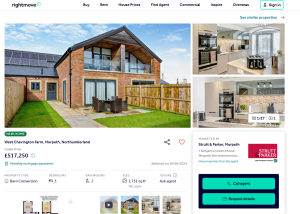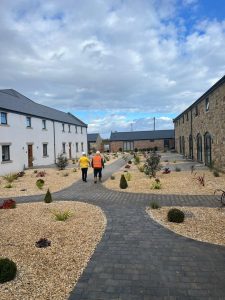n the ever-evolving landscape of investment opportunities, property development continues to stand out as a compelling option for those seeking substantial returns and long-term wealth creation. The question “Are property developments a good investment?” is one that many potential investors grapple with, especially in the current economic climate. This article will explore the various aspects of property development investment, with a particular focus on the opportunities available in the North East of England.
Property development has long been regarded as a solid investment strategy, and for good reason. The UK property market has shown remarkable resilience and growth over the years, with residential property values increasing at an average rate of 6.6% annually since 2000. This steady appreciation, coupled with the potential for rental income, makes property development an attractive proposition for investors looking to diversify their portfolios and build long-term wealth.
WHY PROPERTY DEVELOPMENT IS ALWAYS A GOOD INVESTMENT
One of the primary reasons property development remains a consistently good investment is the fundamental principle of supply and demand. The UK continues to face a housing shortage, with demand far outpacing supply in many areas. This imbalance creates opportunities for developers to meet the growing need for housing while potentially reaping significant rewards.
Moreover, property is a tangible asset with intrinsic value. Unlike some other investment vehicles, real estate provides a physical asset that can be seen, touched, and utilised. This tangibility often provides investors with a sense of security and control over their investment.
The potential for capital appreciation is another compelling factor. Well-located properties tend to increase in value over time, influenced by factors such as population growth, urbanisation, and infrastructure development. For instance, the collective value of homes across the UK rose to a staggering £7.8 trillion in 2019, representing an increase of £124 billion from the previous year.
IS PROPERTY THE RIGHT INVESTMENT FOR YOU?
While property development can be lucrative, it’s essential to consider whether it aligns with your investment goals, risk tolerance, and financial situation. Property development requires a significant upfront investment and often involves a longer-term commitment compared to more liquid assets.
It’s worth noting that the average rental yield in the UK stands at 5.03% as of September 2023, up from 4.8% the previous year. Interestingly, the North East region currently offers the highest rental yields in the UK at 7.2% on average, making it an particularly attractive area for investment.
HOW CAN I GET INTO UK PROPERTY DEVELOPMENT FOR THE FIRST TIME?
For first-time developers, entering the property development market can seem daunting. However, there are several strategies to consider:
- Start small: Begin with a single property renovation project to gain experience and build credibility with lenders.
- Partner with experienced developers: Collaborating with seasoned professionals can provide valuable insights and potentially easier access to financing.
- Educate yourself: Attend property investment seminars, read industry publications, and network with other developers to expand your knowledge base.
- Seek professional advice: Consult with real estate agents, financial advisors, and legal professionals to ensure you’re making informed decisions.
PROPERTY DEVELOPMENT: ADVANTAGES AND CONSIDERATIONS
Advantages of property development include the potential for substantial profits, especially in areas with strong growth prospects. For example, Manchester has become a hotspot for property investment, with some neighborhoods like Media City & Salford Quays offering average rental yields of 8.22%.
However, it’s crucial to consider the risks and challenges associated with property development. These can include market fluctuations, unexpected construction costs, and regulatory hurdles. It’s also worth noting that by 2036, the average house price in the UK could reach £800,000, which may impact affordability and investment strategies in the long term.
EXPERT ADVICE FOR FIRST-TIME DEVELOPERS
When embarking on your first property development project, consider the following expert tips:
- Location is key: Research areas with strong growth potential and high rental demand.
- Understand your target market: Tailor your development to meet the needs of your intended tenants or buyers.
- Build a reliable team: Surround yourself with experienced professionals, including contractors, architects, and legal advisors.
- Plan for contingencies: Always factor in a buffer for unexpected costs and delays.
- Focus on sustainability: Eco-friendly features can increase property value and appeal to environmentally conscious tenants or buyers.
DIFFERENT TYPES OF PROPERTY INVESTMENT
Property investment comes in various forms, each with its own set of advantages and considerations:
Buy-to-let
Purchasing property to rent out for income.
House flipping
Buying, renovating, and quickly selling properties for profit.
Commercial property
Investing in office spaces, retail units, or industrial buildings.
Real Estate Investment Trusts (REITs)
Investing in companies that own and manage income-generating properties.
Property development
Building new properties or substantially renovating existing ones.
AVERAGE RETURNS ON PROPERTY INVESTMENT
Returns on property investment can vary widely depending on location, property type, and market conditions. However, the UK residential real estate market is projected to grow from £280.26 billion in 2023 to £370.67 billion by 2028, with a compound annual growth rate of 5.75%. This growth potential, combined with rental yields, can lead to attractive overall returns for savvy investors.
FINDING THE RIGHT FINANCE PARTNER FOR YOUR PROPERTY DEVELOPMENT VENTURE
Securing appropriate financing is crucial for successful property development. It’s important to work with lenders who understand the unique challenges and opportunities in property development. Interestingly, 74% of buy-to-let properties were bought through limited companies in 2023, indicating a trend towards more structured investment approaches.
Billy Jackson, CEO of Northumberland Living, emphasises the company’s commitment to sustainable development: “At Northumberland Living, we take immense pride in preserving the natural environment while creating developments that generate above-market returns for our investors. Our approach is to blend innovative design with respect for the local landscape, ensuring that our projects not only provide excellent investment opportunities but also enhance the communities we build in.”
In conclusion, property development can indeed be a good investment, particularly in regions like the North East of England where rental yields are currently the highest in the UK. However, success in property development requires careful planning, market research, and a long-term perspective. By understanding the various aspects of property investment and working with reputable developers like Northumberland Living, investors can potentially reap significant rewards while contributing to the growth and development of thriving communities.
Property Developer Northumberland
Northumberland Living stands as a beacon of excellence in the North East’s housing market. As a premium developer, we’ve established ourselves as leaders in crafting luxury homes that seamlessly blend the timeless charm of the region with modern sophistication. Contact us today to discuss developments that we are currently raising capital for.






